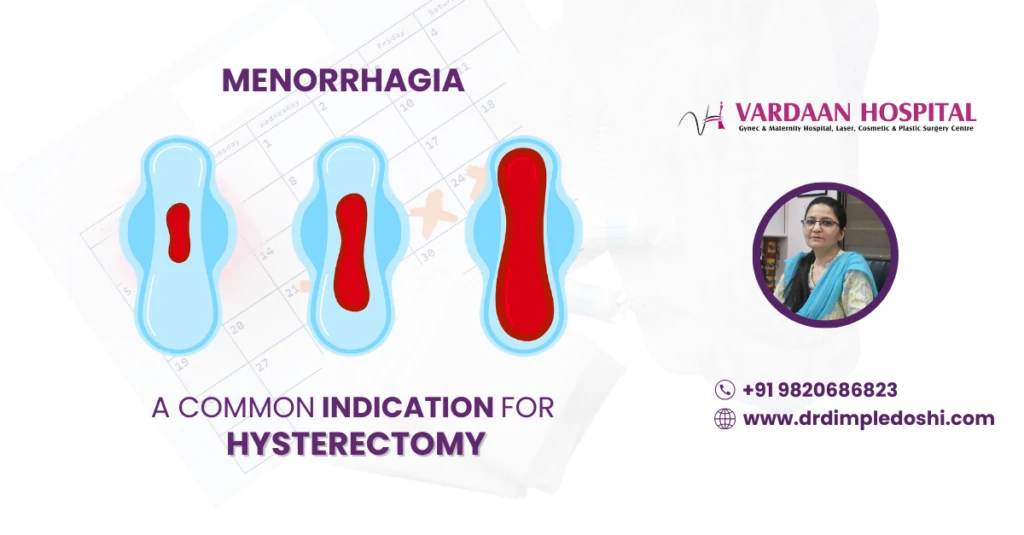Menorrhagia Treatment in Goregaon West, Mumbai: Expert Solutions for Heavy Menstrual Bleeding

Dr. Dimple Doshi (MBBS, MD, DGO)
Female Obstetrician and Gynecologist
27+ years’ experience
20,000+ surgeries completed
Heavy Periods Disrupting Your Life? It Could Be Menorrhagia
Are you experiencing menstrual bleeding so heavy that you soak pads or tampons every hour, pass large blood clots, or feel exhausted after your periods? These could be signs of menorrhagia—a condition many women ignore until it starts affecting daily life.
Heavy periods aren’t just an inconvenience—they can lead to anemia, weakness, and severe lifestyle disruptions. Many women silently suffer, assuming it’s “normal,” while their energy, productivity, and confidence take a hit every month.
The good news? Menorrhagia is treatable. From advanced medications to minimally invasive procedures, there are safe and effective ways to control heavy bleeding and restore your health.
At Vardaan Hospital, Dr. Dimple Doshi offers personalized evaluation and expert treatment to help you regain comfort and confidence in your menstrual cycle.
What Is Menorrhagia (Heavy Periods)?
Menorrhagia is abnormally heavy or prolonged menstrual bleeding that can interfere with daily activities and often requires medical evaluation.
- Bleeding lasting more than 7 days
- Passing large clots during menstruation
- Soaking pads or tampons every hour for several hours
- May lead to anemia and fatigue if untreated
Synonyms: Heavy menstrual bleeding, abnormal uterine bleeding (AUB), prolonged periods, excessive menstrual flow, flooding menstruation
What Is the Incidence of Menorrhagia in Women?
Menorrhagia affects about 9–14% of women globally during their reproductive years. In India, its prevalence is higher, ranging between 17% and 20%.
- One of the most common reasons for gynecology consultations
- More prevalent in women aged 30–49 years
- Can lead to anemia and reduced quality of life if untreated
Synonyms: Heavy menstrual bleeding incidence, abnormal uterine bleeding prevalence, menorrhagia statistics
What Are the Symptoms of Menorrhagia?
Watch for these signs of heavy menstrual bleeding:
- Bleeding longer than 7 days
- Soaking one or more pads/tampons every hour
- Passing clots larger than 1 inch
- Waking at night to change protection
- Fatigue, dizziness, shortness of breath (due to anemia)
- Pelvic pressure or cramping
How Do Heavy Periods Affect Your Life and Health?
Menorrhagia doesn’t just affect your periods—it impacts your overall well-being:
- Avoiding travel, work, or social events
- Constant fear of leaks and stains
- Chronic fatigue, irritability, and mood swings
- Relationship stress and reduced confidence
Emotional Impact: “I dreaded every cycle and planned my life around my bleeding.”
What Are the Causes of Heavy Menstrual Bleeding?
Menorrhagia can result from multiple underlying conditions:
- Structural Causes: Fibroids, adenomyosis, polyps, endometrial hyperplasia, endometriosis
- Hormonal Causes: PCOS, perimenopause, thyroid disorders, obesity-related estrogen dominance
- Infections: Chronic pelvic inflammatory disease (PID)
- Drug-Induced: Anticoagulants, NSAIDs, hormone therapies
- Malignancy: Endometrial or cervical cancer (must be ruled out)
What Are the Risk Factors for Menorrhagia?
Several factors can increase the risk of menorrhagia, including genetic, hormonal, and medical conditions that affect menstrual health.
- Family history of abnormal uterine bleeding or clotting disorders
- Obesity and lifestyle-related hormonal imbalances
- Presence of uterine fibroids, polyps, or endometrial abnormalities
- Prolonged use of medications like anticoagulants or hormonal therapy
- Underlying conditions such as thyroid disorders or PCOS
How Is Menorrhagia Diagnosed?
Diagnosis involves detailed history, clinical evaluation, and investigations:
- Menstrual diary and symptom review
- Physical and pelvic examination
- Transvaginal ultrasound (TVS)
- Blood tests: Hemoglobin, thyroid profile, hormone levels, clotting tests
- Endometrial biopsy (if age >35 or irregular bleeding)
- Hysteroscopy for uterine cavity visualization
- MRI for complex fibroids or adenomyosis
What Are the Possible Complications of Untreated Menorrhagia?
If left untreated, menorrhagia can lead to severe health problems such as anemia, fertility issues, and in rare cases, endometrial cancer.
- Severe anemia causing weakness, dizziness, and heart strain
- Chronic fatigue and compromised immune system
- Infertility or recurrent pregnancy losses
- Endometrial hyperplasia, which may increase cancer risk
When Should You Seek Medical Help for Menorrhagia?
Contact your gynecologist if you experience:
- Bleeding lasting more than 7 days
- Soaking pads/tampons hourly
- Severe fatigue, dizziness, or breathlessness
- Large or frequent blood clots
- Bleeding between periods, post-sex, or after menopause
What Are the Treatment Options for Menorrhagia in Mumbai?
Treatment is tailored to cause, age, and fertility goals:
- Medical: Tranexamic acid, hormonal pills, progestins, Mirena IUD, iron supplements
- Minimally Invasive: Hysteroscopy for polyp/fibroid removal, endometrial ablation
- Advanced Surgery: 3D laparoscopic myomectomy or hysterectomy using Karl Storz Rubina 4K system
What Lifestyle Changes Can Help Reduce Heavy Periods?
Adopting healthy lifestyle habits can help manage menorrhagia symptoms and improve overall menstrual health.
- Maintain a healthy weight and follow a balanced diet
- Include iron-rich foods and take supplements if needed
- Avoid self-medication and excessive use of painkillers
- Practice stress management techniques like yoga or meditation
- Stay hydrated and ensure adequate physical activity
Why Choose Dr. Dimple Doshi for Menorrhagia Treatment in Mumbai?
Dr. Dimple Doshi is a leading gynecologist in Mumbai with over 27 years of experience, specializing in advanced treatment for heavy menstrual bleeding (menorrhagia).
- 27+ years of expertise in gynecology and women’s health
- Pioneer in 3D laparoscopic surgery for AUB and fibroid management
- Empathetic, patient-first approach for personalized care
- Comprehensive diagnosis and treatment at Vardaan Hospital, Goregaon
Which Is the Best Hospital for Menorrhagia Treatment in Goregaon, Mumbai?
Vardaan Hospital in Goregaon, Mumbai, is a trusted center for managing heavy menstrual bleeding with state-of-the-art technology and expert gynecological care.
- Advanced diagnostic tools for accurate evaluation
- Specialization in minimally invasive and 3D laparoscopic procedures
- Comprehensive care for AUB, fibroids, and hormonal disorders
- Patient-centered approach under Dr. Dimple Doshi’s leadership
Medical Code for Menorrhagia
ICD-10 Codes for Menorrhagia (Heavy Menstrual Bleeding)
| ICD-10 Code | Description |
|---|---|
| N92.0 | Excessive and frequent menstruation with regular cycle |
| N92.1 | Excessive and frequent menstruation with irregular cycle |
| N92.2 | Excessive menstruation at puberty |
| N92.3 | Ovulation bleeding |
| N92.4 | Excessive bleeding in premenopausal period |
| N92.5 | Other specified irregular menstruation |
CPT Codes for Menorrhagia Evaluation & Treatment
| CPT Code | Description |
|---|---|
| 99213 | Office or outpatient visit for evaluation and management (low complexity) |
| 99214 | Office or outpatient visit for evaluation and management (moderate complexity) |
| 76830 | Transvaginal ultrasound for uterine evaluation |
| 76856 | Pelvic ultrasound, complete |
| 58100 | Endometrial biopsy (sampling of uterine lining) |
| 58555 | Hysteroscopy, diagnostic (to evaluate uterine cavity) |
| 58558 | Hysteroscopy with removal of lesion or biopsy (endometrial) |
| 58563 | Hysteroscopic endometrial ablation for heavy bleeding |
| 96372 | Therapeutic injection (e.g., hormonal treatment) |
FAQs – Heavy Periods and Menorrhagia Management
Q1. How long does menorrhagia usually last?
Ans. Menorrhagia typically lasts longer than 7 days, which is considered abnormal for menstrual bleeding.
Q2. How much blood loss is considered heavy during a period?
Ans. Losing more than 80 ml of blood per cycle or soaking through a pad/tampon every 1–2 hours is considered heavy bleeding.
Q3. What are the common complications of untreated menorrhagia?
Ans. Untreated menorrhagia can lead to severe anemia, fatigue, dizziness, and in rare cases, heart complications.
Q4. Can menorrhagia affect fertility?
Ans. Yes, chronic heavy periods may indicate underlying conditions like PCOS or fibroids, which can impact fertility.
Q5. What foods should you avoid during heavy periods?
Ans. Avoid high-salt, processed foods, and caffeine as they can worsen bloating and discomfort during heavy periods.
Q6. Can stress cause menorrhagia?
Ans. While stress doesn’t directly cause menorrhagia, it can disrupt hormonal balance, potentially leading to irregular or heavy bleeding.
Q7. Is menorrhagia linked to PCOS?
Ans. Yes, PCOS can cause irregular cycles and heavy bleeding, but menorrhagia can also occur without PCOS.
Q8. Can you get pregnant if you have menorrhagia?
Ans. Yes, pregnancy is possible, but it may be challenging if the heavy bleeding is due to hormonal imbalance or other underlying issues.
Q9. What is the first-line treatment for menorrhagia?
Ans. The first line of treatment includes medications like NSAIDs, tranexamic acid, or hormonal therapy, depending on the cause.
Q10. When should you go to the hospital for heavy periods?
Ans. If you are soaking a pad every hour for several hours or feel dizzy, weak, or short of breath, seek emergency care immediately.
Q11. What vitamin deficiencies can worsen heavy bleeding?
Ans. Iron and Vitamin K deficiencies can contribute to prolonged or heavy menstrual bleeding.
Q12. Can heavy periods be controlled without surgery?
Ans. Yes, most cases of menorrhagia are managed with medication, hormonal therapy, and lifestyle changes before considering surgery.
Q13. What is the role of diet in managing menorrhagia?
Ans. A diet rich in iron, Vitamin C, and folate helps replenish lost nutrients and reduce anemia caused by heavy periods.
Q14. How do doctors diagnose the cause of heavy bleeding?
Ans. Diagnosis may involve blood tests, ultrasound, hysteroscopy, or endometrial biopsy to identify underlying causes.
Q15. Can hormonal birth control help with menorrhagia?
Ans. Yes, birth control pills or hormonal IUDs are often prescribed to regulate menstrual flow and reduce heavy bleeding.
Take charge of your health today.
Book your consultation with Dr. Dimple Doshi at
Vardaan Hospital, Goregaon West, Mumbai.
